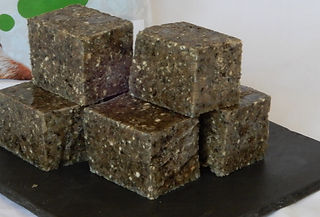
Dogs
Muscle Meat: 60%
Green Tripe: 20%
Offal: 10%
Meaty Bones: 10%
Cats
(greater need for protein & fats than dogs, and lower need for bones, tripe etc)
Muscle Meat: 83-85%
Offal: 10%
Meaty Bones: 5-7%
Muscle Meat: 60% for Dogs , 83-85% for Cats

Examples: Chicken, Lamb, Veal, Possum, Venison, Goat, Turkey, Wallaby, Rabbit, Venison, Heart
Benefits: Primary protein source for energy and building muscle tissue. Provides wide range of vitamins, minerals and essential fatty acids. In particular key source of phosphorous to balance the calcium from bones.
Tips: Feed at least 3 or 4 a week. Don’t overdo any one. Never cook the meat as it loses a lot of the nutrients.
Green Tripe: 20% for Dogs. Small amount for Cats (e.g 5%) if they will take it (most don't like it)

Examples: Unwashed green tripe from stomach of plant-eating animals such as cows, sheep etc
Benefits: Contains the nutrient-rich fermented plant matter, including probiotics with anti-inflammatory properties, enzymes to aid digestion, amino acids to help muscles and gastric juices which help clean teeth. It is a great source of fibre, plus contains minerals such as iron, zinc, potassium and selenium. Tripe is also a “white” meat and is good for pets with sensitive digestive tracts or food allergies.
Tips: if feeding bones always feed with tripe as it aids their digestion and nutrient absorption
Offal: 10%

Examples: Liver, kidneys
Benefits: Nutrient-dense. Good for pets with constipation. Liver has gram for gram more nutrients than any other food source. It is a great source of Taurine, the essential amino acid that promotes healthy ocular and cardiovascular health and which cats have to source from meat. Best natural source of vitamin A which is great for skin, bones, sight, nerves and muscles. Kidneys have good levels of iron and zinc and anti-oxidant vitamin B6 in particular.
Tips: Only feed a max of 5% of liver in a diet.
Bones: 10% for dogs 5-7% for cats

Examples: Softer bones for eating/digesting: chicken necks, veal brisket, veal neck/neck bones, goat bones.
Benefits: Bones are full of calcium and phosphorus which are essential for healthy teeth and strong bones. The gnawing/ chewing action helps clean the teeth and gums, preventing tartar build-up, plus generating gastric juices for better digestion of raw meats, immunity against pathogens and also serves to exercise the jaw, neck and shoulder muscles.
Tips: Give size appropriate bones. Avoid weight-bearing bones (e.g cannon bones), as these can crack teeth, especially if left in sun to dry out. Never feed cooked bones as higher risk of splintering.
Other Appropriate Raw Foods
 Examples: Fish, Vegetables/fruit and Eggs
Examples: Fish, Vegetables/fruit and Eggs
FISH
Fish is the best source of Omega 3 fats with its anti-inflammatory properties and small amounts would have occasionally been eaten as part of a primordial diet. Oily fish such as sardines, herring, pilchards and salmon contain the most Omega 3 (over 1000mg per 100gms of fish). Fish oil supplements can also be used if whole fish not available, however, they are prone to oxidisation and unlike whole fish do not contain the natural form of the anti-oxidant Vitamin E to counteract this, (stripped out during processing and a synthetic, less bioavailable form added back in). Add three crushed almonds to the meal if using fish oils as a this provides a Vitamin E boost.
Tips: Possum is also a good source of Omega 3 if fish not available. Include fish in diet if feeding a lot of poultry to balance the fats, (chicken is relatively high Omega 6 with its inflammatory properties).
VEGETABLES/FRUIT
In the whole prey diet approximately 3 or 4% would comprise carbohydrates from plants/ fruits, usually via the stomach of the herbivorous prey. Feeding green tripe will ensure these carbs are achieved, however if not feeding tripe, then 3 or 4 % of vegetables/ fruit can be added to help provide additional micro-nutrients. Mulch or puree the veggies/fruit as dogs cannot breakdown the cellulose in the vegetable/fruit skin.
Tips: if feeding veggies, avoid starchy vegetables such as potatoes as this will make the stomach more alkaline.
EGGS
Eggs are a complete protein source, full of nutrients. They are a great source of Vitamin D in particular, so 1 or 2 a week if you wish as they would have been normal in the primordial diet.
Tips: If free-range, feed the finely ground shell as well as a good source of calcium.


